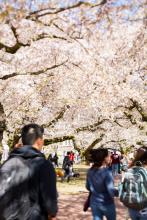Back in early March, before the Governor Inslee issued state-wide orders to shelter in place as part of the COVID-19 response, the UW Sociology department hosted a successful Graduate Student Recruitment Weekend, which is designed to introduce admitted graduate students to the Sociology Department at the University of Washington. The two-day program offers admitted applicants a wonderful chance to meet our faculty, current graduate students, and other prospective students. A chat with our Director of Graduate Studies, Bill Lavely, showed how even in the midst of uncertainty, or perhaps because of it, sociology continues to be a draw, and how Recruitment Weekend provides an opportunity to have those first real conversations between new colleagues.
What, to you, is the most unique thing about the graduate program in Sociology at UW?
There is a high degree of solidarity among the students, and strong involvement in department affairs. As in other departments, our students collaborate with faculty mentors, but in our department, students often co-author papers with each other. Students also take part in the management of the department. They serve on admissions and recruitment committees, and they organize departmental events such as the weekly research seminar SocSem.
What kind of support do graduate students get from the Director of Graduate Studies and the Graduate Program Advisor while pursuing their PhD in Sociology?
The Graduate Program Advisor monitors student progress through the program, records progress, and keeps students on track to finish their degrees. Students my need help in navigating special situations, such as joint degrees, waiving course requirements, or taking a leave of absence. The GPA advises students how to do it, and how to do it efficiently.
The Director of Graduate Studies leads a weekly pro-seminar in sociology for the first-year cohort. The pro-seminar connects students to university resources and introduces students to research underway in the department. It also takes up topics of professional socialization—everything from what to do at an annual convention, how to build a CV, and how to apply for grants and fellowships.
How does this work support entire cohorts and help the department be as robust as it is?
The first year of the program is a kind of “boot camp” of required courses in statistics and research methods. It’s cohort experiences that build close working relationships. In subsequent years student branch out, with more focus on research. Students participate in an MA seminar where they test out their ideas before an audience of their peers. The seminar not only nurtures master’s thesis projects, it spawns research collaborations among the students.
Graduate Recruitment Weekend: How did the last one go?
We generally have ten or twelve potential recruits visit. This year, despite concerns about COVID-19 in the Seattle area, we still had nine visitors. There is a schedule of presentations about the department, there is a research seminar, and the visitors can meet with individual faculty members, but a key aspect is, the visitors meet and socialize with our currents students. They come away with an inside look at the department and what they can expect.
What makes Graduate Recruitment Weekend so unique? What do we learn about potential students, and what do they get to learn about us?
Recruitment Weekend is not a show, or an advertising pitch, or a glossy brochure. It’s an intellectual and social event where we, faculty and students, meet potential colleagues, discuss research interests, and see if there is some fit, or even some chemistry. There are intangibles that can’t be communicated in a student file or a department website, and they come across at Recruitment Weekend. The visitors are deciding where to spend several years in professional training—a weighty decision. Our faculty and students are also contemplating building working relationships with the visitors that could span years or decades. So there is high anticipation and real excitement on both sides.
